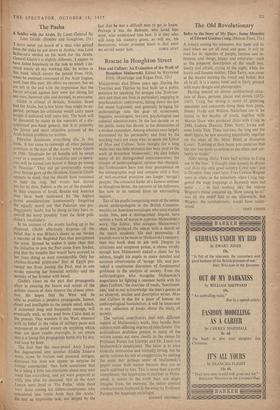Rescue in Houghton Street
Man and Culture: An Evaluation of the Work of Bronislaw Malinowski. Edited by Raymond Firth. (Routledge and Kegan Paul, 32s.)
MALINOWSKI died fifteen years ago. During the Twenties and Thirties he had built up a public presence by speaking for savages (the Trobrian- ders and their sex lives in particular), engaging in psychoanalytic controversy, laying down the law for social hygienists, and generally bringing his anthropology into the gaze of economists, linguists, sociologists, lawyers, psychologists and colonial administrators. In the last decade or so his public name has shrunk to the dimensions of a modest reputation. Among scholars once largely dominated by his personality and fired by his teaching there are some who, to quote the Editor of Man and Culture, `have thought for a long while that too little attention has been paid to the work of Bronislaw Malinowski.' He died before many of his distinguished contemporaries; the climate of anthropological opinion has changed; the Trobrianders have lost their prominence on the ethnographic map and compete with a host of well-recorded primitive (no longer `savage') peoples. The colourful leader of a famous seminar in Houghton Street, the autocrat of his followers, has now to be rescued from an encroaching neglect.
Ten of his pupils (comprising most of the senior social anthropologists in the British Common- wealth), an American sociologist who once studied under him, and a distinguished linguist have written a book of essays to appraise Malinowski's work. The Editor, who occupies Malinowski's chair, has prefaced the essays with a sketch of the man's academic life and personality. If amends were to be made to Malinowski's memory, then this book does its job well. Despite its criticisms and tempered praise, it shows vividly enough how Malinowski staked a claim for his subject, taught his pupils to make detailed and accurate observations of `savage' life, and pro- voked a continuous discussion of fundamental problems in the analysis of society. Even the anthropologists who recognise Malinowski's importance by fighting a constant battle with his ideas ('culture,' the doctrine of needs, 'functional- ism,' and so on) acknowledge the man's genius as an observer, teacher and descriptive writer. Man and Culture is due for a place of honour on anthropological bookshelves; it will be important in any collection of books about the study of society.
The various contributors deal with different aspects of Malinowski's work; they handle their subjects with differing degrees of detachment. The ambivalence doubtless present in many of the writers comes out most clearly in the essays by Professor Fortes (on kinship) and Dr. Leach (on Malinowski's empiricism). The latter is at once violently destructive and violently loving, but he partiy redeems his sins of exaggeration by making the point that perhaps some of Malinowski's pupils resent their master because they are so much indebted to him. This is more than a pretty compliment; the importance it ascribes to Malin- owski is nearer to the truth than one might imagine from, for example, the rather comical condescension displayed in the essay by Professor Parsons, the American sociologist.
N1AURICE FREEDMAN


































 Previous page
Previous page